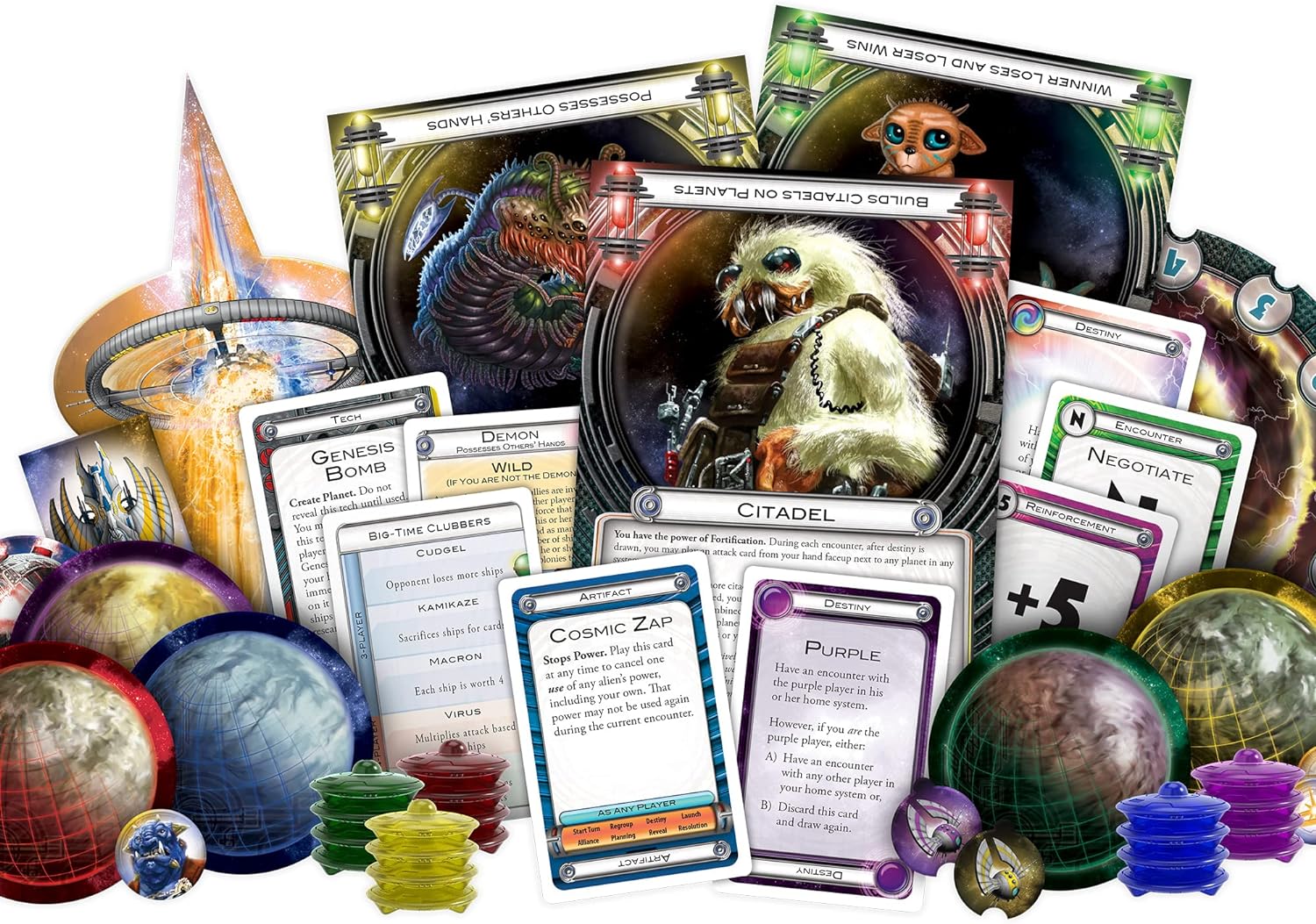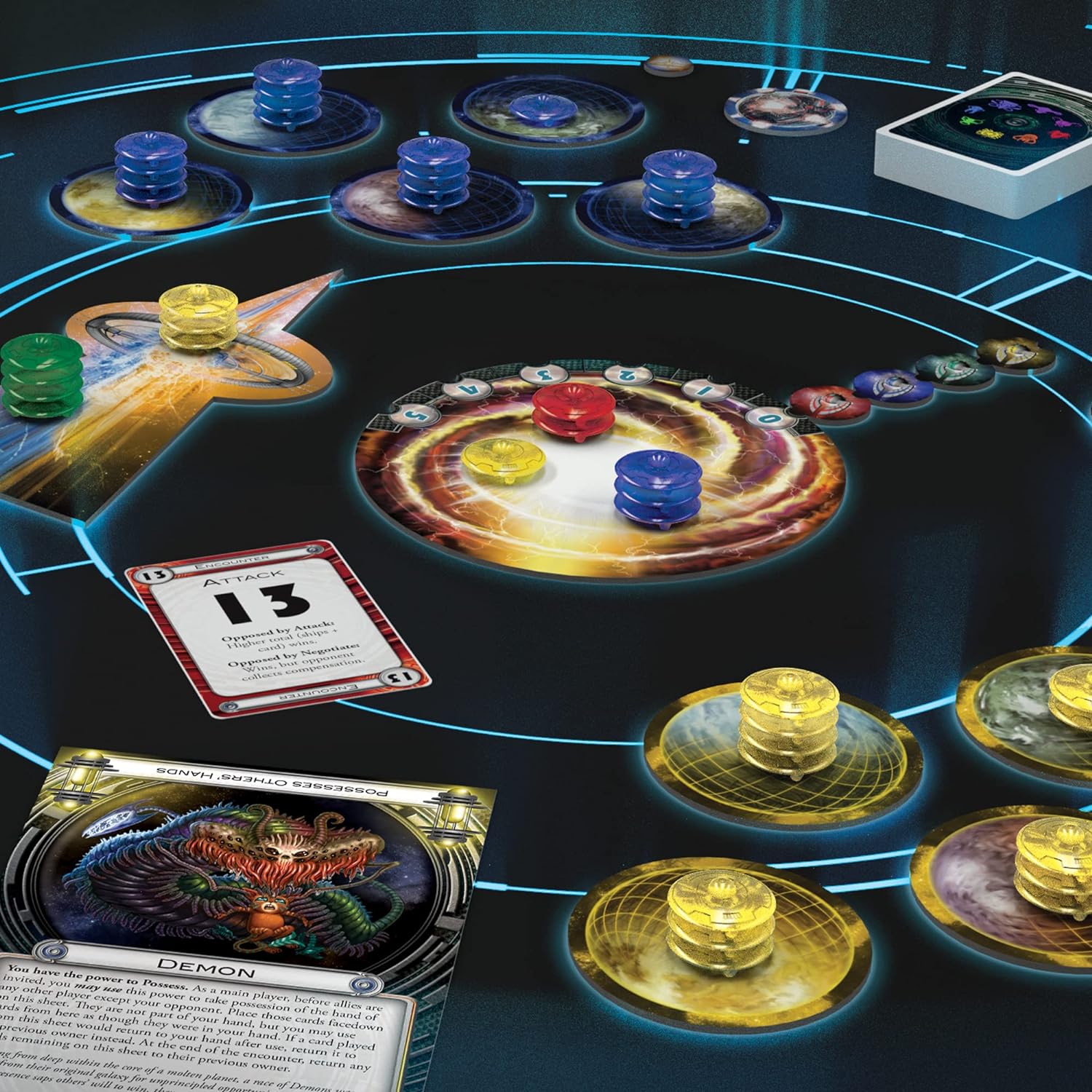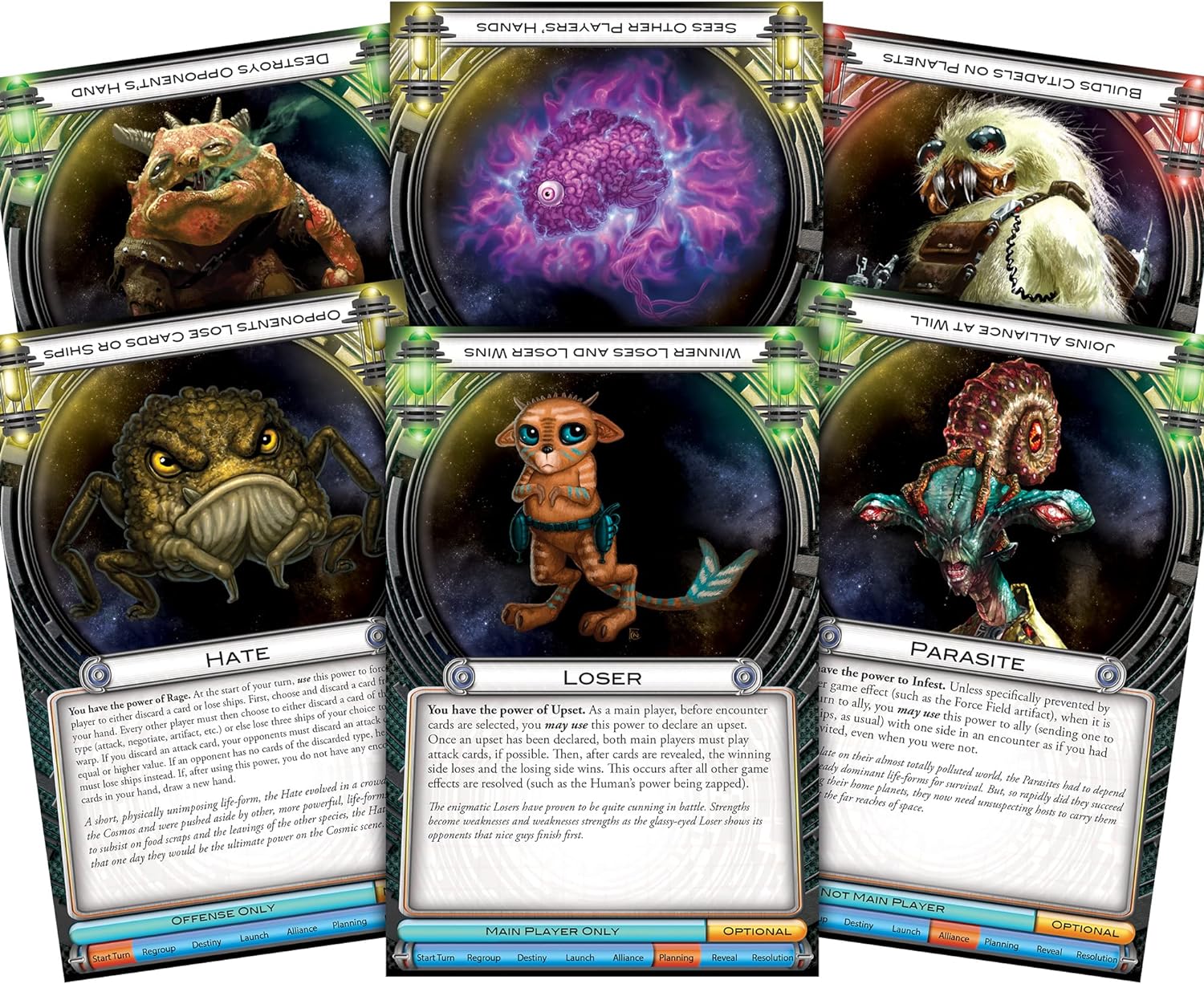In the vast expanse of the cosmos, Cosmic Encounter unfolds as a grand space epic, where players assume the roles of intrepid alien species, each with its own unique abilities and ambitions.
Set against the backdrop of a galactic council, the game immerses you in a thrilling narrative of diplomacy, cunning strategy, and cosmic warfare. As alien leaders, you’ll forge alliances with strange and wondrous civilizations, engage in cosmic negotiations, and ultimately, strive to establish your dominance over the galaxy.
With a universe of possibilities at your fingertips, Cosmic Encounter is a saga of cosmic conquest and diplomacy like no other.
Explore the mysteries of the cosmos, form interstellar coalitions, and launch epic offensives against rival species.
Every encounter is a story waiting to be written, making Cosmic Encounter a celestial odyssey that captures the essence of cosmic diplomacy, intrigue, and boundless adventure.
What’s included in Cosmic Encounter

- Planet Tokens: These represent player home planets and are placed in front of each player.
- Player Tokens: Each player selects a color and takes the corresponding ships, colonies, and player tokens.
- Alien Sheets: Shuffle the alien sheets and deal one to each player, who keeps it secret.
- Destiny Deck: Create a deck with the same number of cards as players. Shuffle it and place it face down.
- Rewards Deck: Shuffle this deck and place it face down.
- Hyperspace Gate: Place it at the center of the play area.
- Challenge Cards: These cards represent attack and negotiate cards and are separated into two decks, one for each type.
- Flare Cards: Shuffle these and place them face down.
- Lucre Tokens: These are the game’s currency.
- Challenge Tokens: These track challenges.
- Foreign Colonies: These are colonies that can be established on other players’ planets.
- Technology Cards: Shuffle and deal two to each player.
- Filch Cards: These are associated with certain aliens.
- Planets: Place the planets face down and shuffle them, then deal them out in the hyperspace gate and adjacent to it.
How to play Cosmic Encounter

Setup
- Each player places one ship on each of their home planets and places the remaining ships on their player sheet.
- Each player takes their alien sheet, reads it secretly, and keeps it hidden from other players.
- Shuffle the Destiny Deck and place it face down.
- Shuffle the Flare Cards and deal two to each player.
- Each player starts with 20 Lucre tokens.
- Each player places a colony on their home planet.
Rules for Cosmic Encounter
Cosmic Encounter is played over a series of turns. Each turn consists of several phases:
1. Regroup Phase:
- Take ships from your colonies and place them on the planets you have ships on.
2. Destiny Phase:
- Reveal the top card of the Destiny Deck. This determines which player you will have an encounter with.
3. Launch Phase:
- Choose one of your ships on a planet to be the attacking ship.
- Place your attacking ship in the hyperspace gate.
4. Alliance Phase:
- Players may invite other players to ally with them in the encounter. Alliances are optional and can include up to one offense and one defense ally per side.
5. Planning Phase:
- The main player and their allies choose challenge cards (attack or negotiate) face down and simultaneously reveal them.
6. Reveal Phase:
- Both sides reveal their chosen cards.
- The challenge is resolved according to the revealed cards and alien abilities.
- Rewards (colony or card) are given to the winner, and compensation (cards or Lucre) is given to the loser.
7. Regain Phase:
- If you lost ships in the encounter, you must take them back into your hand.
8. Use Alien Powers Phase:
- Some alien powers activate during this phase.
9. Super Flare Phase:
- If a player has a Super Flare Card, they may use it now.
10. Cosmic Deck Phase: – Draw new cards up to your hand limit if applicable.
Winning: A player wins by establishing colonies on five foreign planets.
For the official rules, see the link below:
Aliens you can play as

- The Loser:
- Ability: Wins when they lose all of their ships from their home planets.
- The Philanthropist:
- Ability: Can give away cards to other players on their turn.
- The Chosen:
- Ability: Chooses which opponent to play against when drawn from the Destiny Deck.
- The Human:
- Ability: May imitate the abilities of other players’ alien races.
- The Fido:
- Ability: May draw a new hand of cards after using all of their encounter cards.
- The Sorcerer:
- Ability: May trade their super flares with other players.
- The Seeker:
- Ability: Can change the challenge card type (attack or negotiate) after both sides reveal their cards.
- The Miser:
- Ability: Gains one Lucre for every ship lost in an encounter.
- The Zombie:
- Ability: Their ships are not sent to the warp when defeated; they return to their colonies.
- The Loser:
- Ability: Wins when they lose all of their ships from their home planets.
- The Pacifist:
- Ability: Wins as a main player if the encounter is not a challenge card.
- The Virus:
- Ability: Can send other players’ ships to the warp when they win as a main player.
- The Sniveler:
- Ability: Gains compensation even when they win an encounter.
- The Healer:
- Ability: Can free ships from the warp by sacrificing some of their own.
- The Observer:
- Ability: Can cancel a challenge card before it is resolved.
- The Shadow:
- Ability: Can play multiple encounter cards in a single challenge.
- The Reincarnator:
- Ability: Reincarnates back into the game when defeated, keeping their hand and cards.
- The Machine:
- Ability: Can have multiple colonies on the same planet, allowing them to establish new colonies faster.
Strategies for Cosmic Encounter
Cosmic Encounter is a highly dynamic and social game that involves negotiation, alliances, and a bit of luck. While strategies can vary depending on your alien race and the current game situation, here are some general tips to help you navigate the cosmic battlefield and increase your chances of winning:
- Know Your Alien: Understand your alien race’s unique abilities and how they can be leveraged throughout the game. Your alien power is your greatest asset, so use it strategically.
- Diplomacy and Alliances: Negotiation is key in Cosmic Encounter. Forge alliances with other players when it benefits you, but don’t be afraid to break alliances when it no longer serves your interests. Make deals, negotiate terms, and uphold your end of the bargain when necessary.
- Timing is Everything: Pay close attention to the timing of your actions. Knowing when to launch your offensive, form alliances, or use your alien power can significantly impact the outcome of an encounter.
- Manage Your Hand: Your hand of encounter cards is your primary tool for success. Balance offensive and defensive cards, and be prepared to use reinforcement cards strategically. Avoid running out of encounter cards at crucial moments.
- Predict Opponent Behavior: Try to anticipate what your opponents will do. Knowing their alien powers and their likely strategies can help you make informed decisions during encounters and negotiations.
- Warp Manipulation: Be cautious about sending other players’ ships to the warp. While this can be a useful tactic, it can also make you a target for retaliation. Consider the consequences before using this power.
- Lucre Economy: Use Lucre wisely. It can be spent to gain allies, negotiate deals, or activate certain alien powers. Don’t overspend, and make sure to collect Lucre when the opportunity arises.
- Dealing with the Wild: In encounters with the Hazard or Space Station, consider your options carefully. You can win by sending more ships than your opponent, even if your encounter card total is lower.
- Bluff and Misdirection: Sometimes, it’s advantageous to play coy and make your opponents uncertain of your intentions. Bluffing can be a powerful tool in negotiations and encounters.
- Keep an Eye on the Win Condition: Remember the main objective is to establish colonies on foreign planets. Don’t lose sight of this goal while getting embroiled in battles and alliances.
- Table Dynamics: Pay attention to the current standings and which players are close to winning. Sometimes, forming temporary alliances to prevent a player from winning can be strategically beneficial.